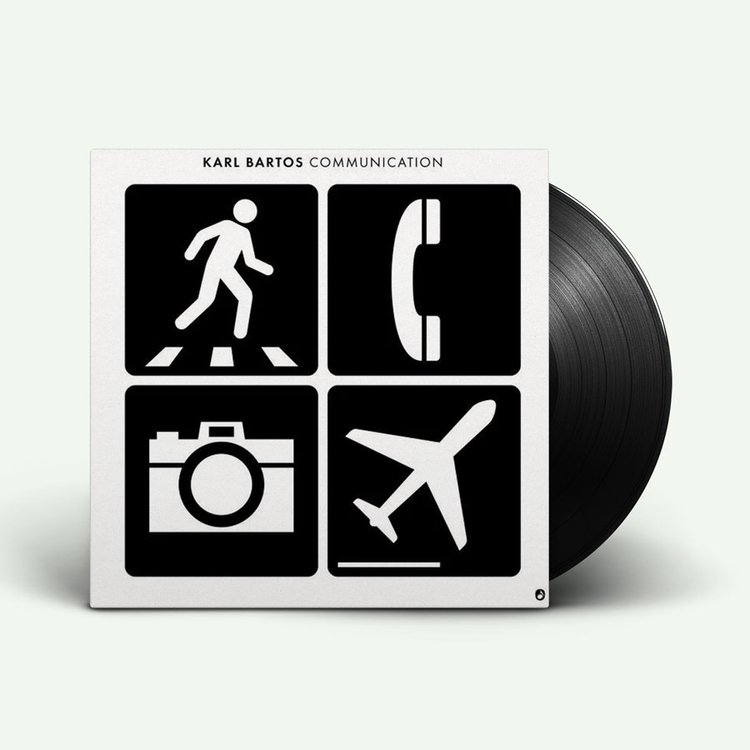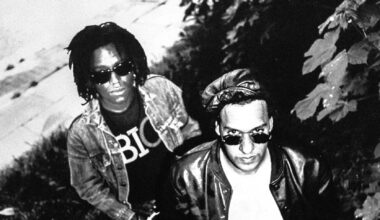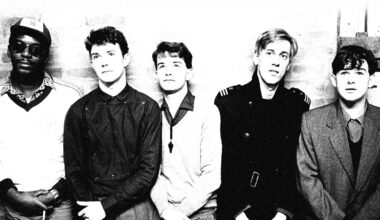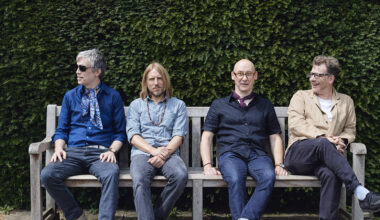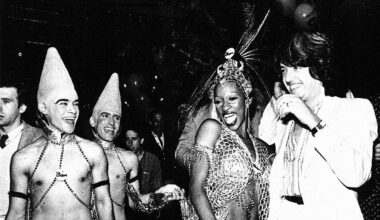The rise of tech and how we use it to communicate is the central focus of Karl Bartos’ debut solo album from 2003. We connect with the former Kraftwerker to talk about the welcome reissue of the record
“The radio would be the finest possible communication apparatus in public life, a vast network of pipes. That is to say, it would be if it knew how to receive as well as to transmit, how to let the listener speak as well as hear, how to bring him into a relationship instead of isolating him. On this principle, the radio should step out of the supply business and organise its listeners as suppliers.”
Bertolt Brecht
“I never liked this ambiguity about atomic energy and bombs. I always thought it would have been much better had they called it ‘Radio On’ or ‘Radio’, and stick on the concept of communication.”
Karl Bartos is talking about Kraftwerk’s ‘Radio-Activity’, his debut vinyl appearance with the band back in 1975, a concept album that, in his eyes, was flawed by its conflating of ideas about radio and radioactivity. Nearly 30 years later, in 2003, Bartos put the “mistake” right, by releasing his first solo album, ‘Communication’. The record got lost in an internal reconstruction at his then label, Sony (the usual woeful tale of corporate neglect), and then, shortly after its release, he was offered a post lecturing at the University of Berlin.
“I stayed there for five years and forgot about the record,” says Bartos, his face crumpling into a broad grin, as it does many times during our time together, chatting in a hotel bar and later trawling the streets near London’s Green Park looking for suitable backdrops for the photos. “But there it was, gathering rust, so why not re-release it?”
So here it is then, ‘Communication’, sounding great 13 years on, sparkly and remastered. There’s a small pile of the CDs on the table between us. The guy from the label responsible for the re-release beams at us happily. The album is presciently fixated on image making, whether it’s photography or the process of fame.
“‘Communication’ in a way was my ‘Radio-Activity’,” explains Bartos. “But it’s not about radio. Radio is very important, should I say was very important, especially in America. And at the beginning of the 20th century, it was the media. Bertolt Brecht actually said that every listener should be an antenna and be able to receive and transmit. There should be a communication going on, but instead we just have receivers. He foresaw the situation of what television would be in the future, where you have the TV connected to the internet and you can respond… [he pauses to look up at the TV above us in the bar and address the newsreader on the screen, saying ”Change your tie, please”]. So I thought I’d make a record on the media, based on the thinking of philosophers and theorists such as Marshall McLuhan and Neil Postman. I always liked these ideas.”
‘Communication’ explores the belief that the media we use shapes our thoughts; that, as McLuhan famously explained, the medium is the message. At the time of the original release of the album, Time magazine announced 2003 was the year the camera phone came of age, because ownership had reached critical mass, and because the impact it had on people’s lives had already provoked a backlash, mainly around ideas of privacy invasion, never mind selfie deaths and the hyper-narcissism of the social media age. Was Bartos thinking about any of this when he embarked on ‘Communication’?
“The funny thing is, I was thinking about the past,” he says. “I read ‘On Photography’ by Susan Sontag, and she was observing the way photography in the past had changed thinking. Neil Postman said that, as people photographed the world, the world changed; people became objects. Photography and film are part of modern mind construction tools. At the end of Sontag’s book, which I highly recommend, it’s super-cheap, is a collection of quotations from Polaroid camera advertisements. I stole some lines from that.”
So that line, “I take a picture of the world” was from a Polaroid advert?
“Probably,” he smirks.

The lyrics on ‘Communication’ are often simplistic, not quite as reduced as Kraftwerk lyrics, but not far off. In ‘Ultraviolet’, Bartos repeats the words, ‘I had to return a video tape…’ until it becomes an almost nightmarish mantra, while simultaneously making you laugh at the very thought of it.
When did any of us last need to return a video tape?
“That’s from another book, ‘American Psycho’,” he explains. “This guy is running through Manhattan, he’s killing people and he has to return a video tape. It’s about visual media. I wasn’t interested in the violent story, I was interested in the state of mind of someone sitting in his apartment in Manhattan, watching television. I thought it could be everybody and everywhere, this strange character in front of a TV with his remote control, zapping through the channels. What would he see? Some commercials about cars, cars that improve his sex appeal, and he feels insulted, and sooner or later there is an anchorman who says, ‘And now…’, so he’s experiencing this cut-up reality. It feels like I have described this character, and he’s observing this cut-up reality.”
Is ‘Communication’ a concept album, like ‘Radio-Activity’ was?
“It is a concept album, but in the end it’s just music, pop music with simple words. If you don’t understand what I’m saying, you should at least have this layer of simple words and pop music; ‘The camera’s going to be my best friend’, that’s fine with me. But nothing is so hard to achieve as simplicity. If I have to explain it, I might refer to Susan Sontag’s book, and she’s referring to another source, like you do at university, but then the problem is it’s not pop music anymore. Sometimes I like to write a song like ‘15 Minutes Of Fame’; ‘Stars ain’t what they used to be’, it’s just blah-blah, but there’s another level, if I write down what it all means, it loses the secret.”
The album heavily features that constant Kraftwerk sonic helpmeet, the vocoder. What is it that seems so attractive to electronic musicians about the sound of synthesised speech?
“It’s like in fables, in ‘Animal Farm’, when animals start to talk… or sometimes in cartoons, when, say, a bottle talks to the alcoholic, ‘Drink me!’. If an idea, or not a human being, starts talking, this is the thing. So in connection to Kraftwerk, the technology talks, teknik talks. So it gives you another perspective, there’s me as a human being, but I can let somebody else talk. ‘I’m a big engine and I drive on the autobahn…’ and then the car starts talking, you hear the sounds of the car. So I think this is the attraction: we want to make technology itself articulate the meaning.”
By contrast, your voice is very human, almost fragile, and quite naked.
“This is what I like,” he says. “And by the way, it’s not always a vocoder, it’s speech synthesis, which is a different thing. You have the phonemes, and you put the phonemes to words, and then you put the words together, so it’s really data entry.”
Deconstructing language into its little carriers?
“Into the tones,” he confirms. “So we have the real voice, which is apparently my point of view, so it’s autobiographical, or it’s someone else, like a journalist, approaching a subject. ‘15 Minutes Of Fame’ is from a journalist’s perspective, whereas ‘Life’ is just first-person singular, me, I. And then ‘The Camera’ is just epic, and it was good to be able to put a big thing like that on the shoulders of somebody anonymous. Lou Reed could have done it in his New York intellectual way, but that doesn’t feel right for me, but this machine, it could do it, so I’m not responsible, it’s the machine.”
Are you writing any new musical material?
“All the time,” he nods. “I wrote a Christmas song recently, but it’s just music, and music only becomes important if I share it with other people, otherwise it’s just my music, inside me, inside my head. It makes me warm from the inside. When I start producing music, it’s a process. I have the vision, and as it becomes reality I’m responsible that the gap between my vision and the reality is not too big.”
When he’s not in London talking about his music, Bartos’ time is taken up writing his autobiography. He keeps office hours, going into his studio after breakfast and writing for six hours a day. He says he’s on his third pass through his life story, filling in the gaps, checking the dates and events he’s chronicling against the evidence in his diaries, which he has kept since 1969. The diaries, he says, capture everything.
“Being in America for the first time in 1975, meeting Bettina [his wife] in 1977, playing The Ritz in New York with Kraftwerk, some reflections, some thoughts…”
So will it tell the full story of his time in Kraftwerk or, thanks to Raph Hütter’s famously litigious tendencies, skirt around it?
“I have no secrets,” he smiles. “I never have. This story is very complex, and for once in my life I wanted to write it down correctly, in my words, and to make sure that everything I say is right, at least my version of the truth, the way I consider reality. There are many threads going on, the music thread, the business thread, there’s my own life and the life of the group. There are so many parallel lines and they have to be communicated with no improvisation, I have to write it down in counterpoint, in a musical way. And this is how I approach the book. It’s a little bit like the composition of a musical form.”
The process is “a nightmare” he adds with a laugh. “But some people will be surprised by how it all looks from the inside.”
We can’t wait.
‘Communication’ is out on Trocadero

